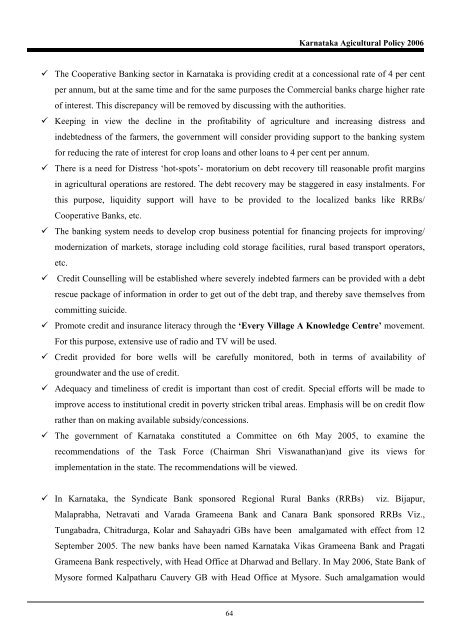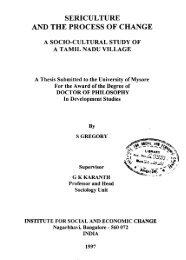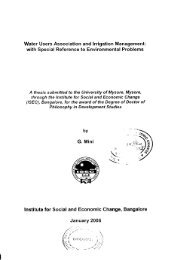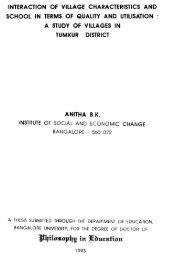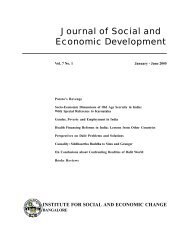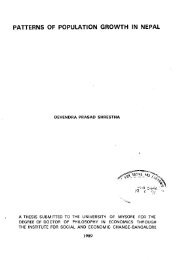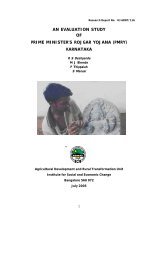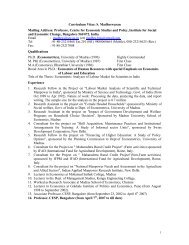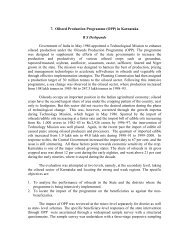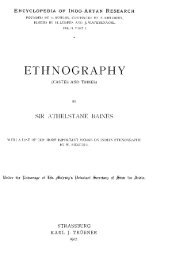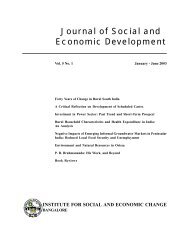Karnataka Agricultural Policy - Institute for Social and Economic ...
Karnataka Agricultural Policy - Institute for Social and Economic ...
Karnataka Agricultural Policy - Institute for Social and Economic ...
Create successful ePaper yourself
Turn your PDF publications into a flip-book with our unique Google optimized e-Paper software.
<strong>Karnataka</strong> Agicultural <strong>Policy</strong> 2006<br />
The Cooperative Banking sector in <strong>Karnataka</strong> is providing credit at a concessional rate of 4 per cent<br />
per annum, but at the same time <strong>and</strong> <strong>for</strong> the same purposes the Commercial banks charge higher rate<br />
of interest. This discrepancy will be removed by discussing with the authorities.<br />
Keeping in view the decline in the profitability of agriculture <strong>and</strong> increasing distress <strong>and</strong><br />
indebtedness of the farmers, the government will consider providing support to the banking system<br />
<strong>for</strong> reducing the rate of interest <strong>for</strong> crop loans <strong>and</strong> other loans to 4 per cent per annum.<br />
There is a need <strong>for</strong> Distress ‘hot-spots’- moratorium on debt recovery till reasonable profit margins<br />
in agricultural operations are restored. The debt recovery may be staggered in easy instalments. For<br />
this purpose, liquidity support will have to be provided to the localized banks like RRBs/<br />
Cooperative Banks, etc.<br />
The banking system needs to develop crop business potential <strong>for</strong> financing projects <strong>for</strong> improving/<br />
modernization of markets, storage including cold storage facilities, rural based transport operators,<br />
etc.<br />
Credit Counselling will be established where severely indebted farmers can be provided with a debt<br />
rescue package of in<strong>for</strong>mation in order to get out of the debt trap, <strong>and</strong> thereby save themselves from<br />
committing suicide.<br />
Promote credit <strong>and</strong> insurance literacy through the ‘Every Village A Knowledge Centre’ movement.<br />
For this purpose, extensive use of radio <strong>and</strong> TV will be used.<br />
Credit provided <strong>for</strong> bore wells will be carefully monitored, both in terms of availability of<br />
groundwater <strong>and</strong> the use of credit.<br />
Adequacy <strong>and</strong> timeliness of credit is important than cost of credit. Special ef<strong>for</strong>ts will be made to<br />
improve access to institutional credit in poverty stricken tribal areas. Emphasis will be on credit flow<br />
rather than on making available subsidy/concessions.<br />
The government of <strong>Karnataka</strong> constituted a Committee on 6th May 2005, to examine the<br />
recommendations of the Task Force (Chairman Shri Viswanathan)<strong>and</strong> give its views <strong>for</strong><br />
implementation in the state. The recommendations will be viewed.<br />
In <strong>Karnataka</strong>, the Syndicate Bank sponsored Regional Rural Banks (RRBs) viz. Bijapur,<br />
Malaprabha, Netravati <strong>and</strong> Varada Grameena Bank <strong>and</strong> Canara Bank sponsored RRBs Viz.,<br />
Tungabadra, Chitradurga, Kolar <strong>and</strong> Sahayadri GBs have been amalgamated with effect from 12<br />
September 2005. The new banks have been named <strong>Karnataka</strong> Vikas Grameena Bank <strong>and</strong> Pragati<br />
Grameena Bank respectively, with Head Office at Dharwad <strong>and</strong> Bellary. In May 2006, State Bank of<br />
Mysore <strong>for</strong>med Kalpatharu Cauvery GB with Head Office at Mysore. Such amalgamation would<br />
64


